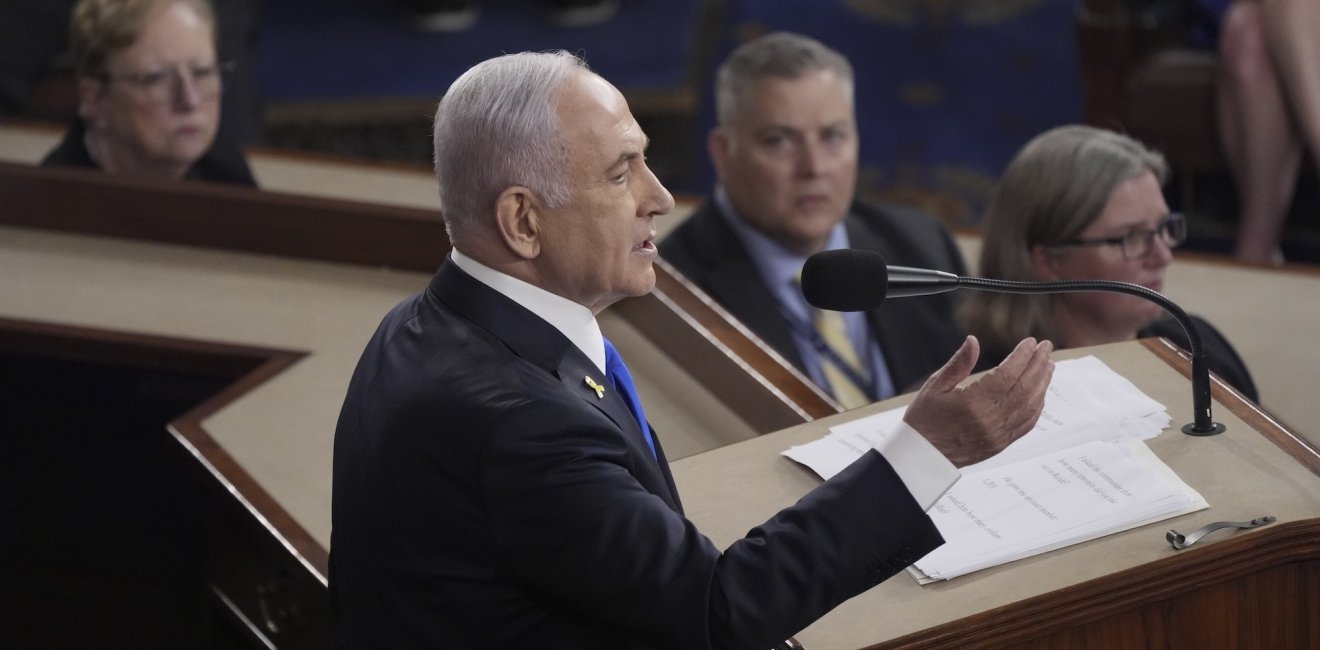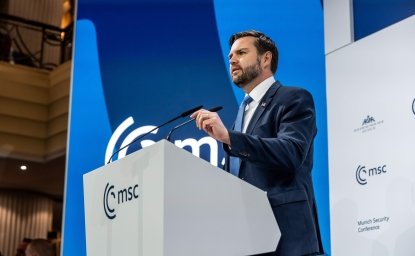360° Reactions: Netanyahu’s Address to the US Congress
Wilson Center Experts and Alumni react to Prime Minister Benjamin Netanyahu’s speech at a joint session of Congress on July 24.
Wilson Center Experts and Alumni react to Prime Minister Benjamin Netanyahu’s speech at a joint session of Congress on July 24.

Prime Minister Netanyahu had two missions in his address to the US Congress this week. First was to express his country’s thanks to the United States for its diplomatic and military support in Israel’s war, not just with Hamas but with the entire Iranian alliance. Second, and more importantly, how Israel sees the Gaza campaign ending: what will replace Hamas, what flexibility this Israeli government has with the Palestinians, and what the diplomatic and military way forward should be with the multifaceted Iranian regional threat.
He succeeded fully with the first goal, praising President Biden’s support repeatedly and energetically (along with a callout to former President Trump for the Abraham Accords). On the second mission, Netanyahu reiterated authoritatively the Israeli military campaign’s goals—eliminate Hamas’ military capabilities (that’s code for conventional offensive), remove it from governance, and repatriate the refugees. The above should and will be taken as Israel’s authoritative position.
On a ceasefire, he said little beyond one brief comment that efforts were underway as he spoke. He hinted at his terms: Hamas “surrendering” and being disarmed could end the conflict immediately.
On the “day after,” he made clear Israel does not want to reoccupy Gaza long term, but must have some sort of security overwatch. He said Gaza should be governed by Palestinians who do not want to make war on Israel, and the area should be subject to demilitarization and deradicalization.
Concerning the larger conflict, he stressed Iranian responsibility for all insecurity in the region and called for unity of effort between the United States, Arabs, and Israel against it, citing the April 14 air defense success, and calling for an “Abraham Alliance” to advance the Abraham Accords.
Concerning Hezbollah, he stressed that he prefers a diplomatic solution but made clear, one way or the other, the northern border must be secured. Finally, he justified his weekend strike on the Houthis but also made clear it was a larger message to whoever strikes Israel.
Whether or not you agree with him, Prime Minister Netanyahu demonstrated a fluency that America's current political leaders should envy. While his message may be muted by the drama of our own presidential contest, he nonetheless made a strong case, reminding his audience of the horrors of October 7, the Iranian role at the root of the multi-faceted conflict in the Middle East today, and Israel's "sacred vow" of "never again" allowing an October 7 to occur.
Which brings us to the Lebanese-Israeli front. Netanyahu chose his words carefully, preferring diplomacy as the path to restoring security on the northern border but ruling out nothing. He pledged to do whatever it takes to secure the border and enable the return of 80,000 Israelis displaced since Hezbollah joined the war on October 8.
Conventional wisdom in Washington seems to be that once a deal is made to bring calm to Gaza, the Israeli-Hezbollah war will also de-escalate. If only it were so simple. Hezbollah and Iran will seek to go back to the pre-October 7 status quo, with their arms and ability to terrorize Israel intact. The question isn't about Hezbollah's intentions; it is about Israel's. Netanyahu may be aware of the costs of a full-scale war with Hezbollah—the sophistication and amount of weaponry on both sides dwarf what we saw in 2006. But he won't allow himself to be outflanked by his right wing, which is motivated by the same "never again" theme Netanyahu invoked in his speech.
For diplomacy to work, it will have to quickly offer a compelling scenario in which Hezbollah can no longer make life-and-death decisions for Lebanese and Israelis alike. Mini-moves—like tweaking UN Security Council Resolution 1701, moving Hezbollah fighters a few miles, or deploying more UN peacekeepers without a mandate to fight—won't cut it. The answer lies in Tehran, not Beirut, and a change in the risk-benefit calculus regarding continued confrontation with the US and its allies. Netanyahu offered a few ideas on that score, but real change in Iranian policy will require the application of real pressure on Iran—not something that will come easily in an election year.
The most important thing to understand about Prime Minister Netanyahu’s speech to the US Congress is that it wasn’t addressed to American ears. The speech was, first and foremost, a prop in Netanyahu’s campaign to rehabilitate his image in Israel. Netanyahu wanted the Israeli public to see him standing in the US House of Representatives defending Israel with his trademark polished English. He wanted to remind the Israelis that he was their best ambassador. It should be remembered that right now, Netanyahu is a beleaguered prime minister, and a majority of Israelis want him to resign and call an election.
In that sense, the speech was probably a success. Netanyahu’s presentation was accompanied by several standing ovations, and the pundits in Israeli TV studios were full of praise for the forceful delivery.
That said, one could fairly easily spot the large number of empty seats in the hall. Many members of Congress refused to applaud. One of them, Jerry Nadler of New York, went even further and released a statement ahead of the speech depicting Netanyahu as the worst leader of the Jewish people in the last two millennia. While Netanyahu was speaking, one Congress member, Rashida Tlaib, raised a sign saying, “war criminal.” Relatives of the hostages demonstrated in the gallery by wearing T-shirts with the inscription “seal the deal now.” Outside the Congress, on the streets of Washington, DC, Israelis, Jews, and Americans were marching against him. There was also a demonstration in Tel Aviv calling on him to accept the hostage deal on offer. So, the troubles back home hounded Netanyahu inside and outside the hall.
The speech itself was replete with homilies and shibboleths and said nothing new. Its main point, it seems, is to exude a Churchillian image of a leader who has nothing to promise his people other than blood, sweat, and tears.
The views represented in this piece are those of the authors and do not express the official position of the Wilson Center.

The Wilson Center’s Middle East Program serves as a crucial resource for the policymaking community and beyond, providing analyses and research that helps inform US foreign policymaking, stimulates public debate, and expands knowledge about issues in the wider Middle East and North Africa (MENA) region. Read more



